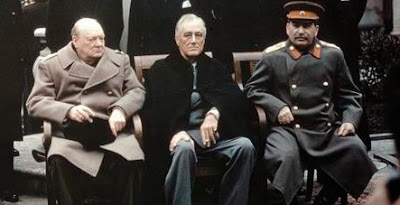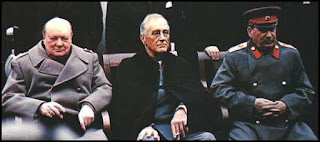 |
| The Yalta Conference, Crimea, February 1945 |
The leaders of the three Great Powers-the Soviet Union, the United States of America and Great Britain-have agreed that in two or three months after Germany has surrendered and the war in Europe has terminated the Soviet Union shall enter into the war against Japan on the side of the Allies on condition that :
- The status quo in Outer-Mongolia (The Mongolian People's Republic) shall be preserved;
- The former rights of Russia violated by the treacherous attack of Japan in 1904 shall be restored, viz:
- the southern part of Sakhalin, as well as all islands adjacent to it, shall be returned to the Soviet Union,
- the commercial port of Dairen shall be internationalized, the preeminent interests of the Soviet Union in this port being safeguarded and the lease of Port Arthur as a naval base of the USSR restored,
- the Chinese-Eastern Railroad and the South-Manchurian Railroad which provides an outlet to Dairen shall be jointly operated by the establishment of a joint Soviet-Chinese Company it being understood that the pre-eminent interests of the Soviet Union shall be safeguarded and that China shall retain full sovereignty in Manchuria;
- The Kuril islands shall be handed over to the Soviet Union.
It is understood, that the agreement concerning Outer-Mongolia and the port and railroads referred to above will require the concurrence of Generalissimo Chiang Kai-shek.
The President will take measures in order to obtain this concurrence on advice from
Marshal Stalin.
The Heads of the three Great Powers have agreed that these claims of the Soviet Union shall be unquestionably fulfilled after Japan has been defeated.
For its part, the Soviet Union expresses its readiness to conclude with the National Government of China a pact of friendship and alliance between the USSR and China in order to render assistance to China with its armed forces for the purpose of liberating China from the Japanese yoke.
February 11, 1945
J. V. STALIN
FRANKLIN D. ROOSEVELT
WINSTON S. CHURCHILL
FRANKLIN D. ROOSEVELT
WINSTON S. CHURCHILL























.jpg)
